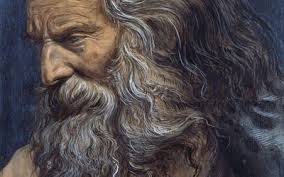The Line of Seth
4: 25-26
The line of Seth DIG: What is the difference between Cain’s line and Seth’s line? In the final analysis, what was each line known for?
REFLECT: When was the last time ADONAI gave you a second chance? What did you do with it? Have you called upon the name of the LORD?

In contrast with the ungodly line of Cain, we are now introduced to the godly line of his brother Seth. In these verses we encounter the first example of a literary device that is typical of the narrative style of Genesis. It follows the line of least significance first (the line of Cain), and now goes back to pick up the line that is of most significance (the line of Seth). Once it does this, it is done with the line of Cain and does not pick it up again. These are general associations. It does not mean that there was never a godly person in the line of Cain, or that every person in the line of Seth was godly.89 In the final analysis, only eight righteous people entered the ark to be saved from the Flood (7:13). Ezeki’el said it best when he proclaimed: The soul who sins is the one who will die. The son will not share the guilt of the father, nor will the father share the guilt of the son. The righteousness of the righteous man will be credited to him, and the wickedness of the wicked will be charged against him (Ezeki’el 18:20).
There are several variations of the number seven in Chapter 4. Abel is mentioned 7 times (1X7), and Cain is mentioned 14 times (2X7). The reference to brother in the pronoun form, like yours, his or mine is mentioned 7 times (1X7). Cain was to be avenged 7 times (1X7), and Lamech was to be avenged ten times 7 (7X10). There are 7 generations from Adam to Lamech (1X7). All the names of Cain’s family total 14 (2X7). The word name appears 7 times (1X7). The names ADONAI and God appear a total of 35 times (5X7).
In the line of Seth there was faith. Adam lay with his wife again, and she gave birth to a son and named him Seth (4:25a). The name Seth means appointed or substituted. The Hebrew root meaning of this name is foundation. While the family of Cain, by building a city, and the invention of worldly arts, was laying a foundation for the kingdom of this world; the family of Seth, by calling on the name of ADONAI began to build a foundation for the Kingdom of God.90
Eve said: God has granted me another seed or child in place of Abel, since Cain killed him before he could have any children(4:25b). The death of Abel left a hole in the soul of Eve. Now the birth of her third son brought back the hope that, through him, Elohim’s promises would eventually be fulfilled (3:15). The fact that Eve recognized God’s program points to her spiritual maturity. When Cain was born she focused on herself and said: I have. But when Seth was born her focus was on ADONAI and she says: God has.
Seth also had a son, and he named him Enosh (4:26a). So his line was not cut off like Abel’s. Enosh is another Hebrew word for man, often related to a Hebrew root meaning to be weak or frail. You have a reflection of this in Psalm 103:15, where David writes: As for man (Enosh) his days are like grass, he flourishes like a flower of the field. Seth understood man’s deep spiritual need.
No more do we read of human accomplishments, but at that time men began to call on the name of the LORD (4:26b). Although at first a small body of believers, later, after the Flood, God will reveal Himself to the whole world. He is not merely the God of Israel, but the LORD of all mankind (Exodus 3:13 and 6:3). It is curious that even though both Cain and Abel worshiped ADONAI, Adam and Eve talked with Him in the Garden, and Cain talked with Him outside the Garden. It was only around the time of Enosh that mankind began to call on the name of the LORD.91 After Enosh was born there was revival. It was a religious turning point. The Hebrew phrase: call upon the name of the Lord means a call to public worship. It signals an act of faith on the part of the worshipers. In later times, it was accompanied by the building of an altar and the offering of a blood sacrifice (Genesis 12:8, 13:4, 26:25; First Kings 18:23-24).
Before the cross on the place called the skull (Luke 23:33), there was a temporary covering of wickedness, or sin, by the shedding of animal blood, as men began to call on the name of the LORD. Moses would write: For the life of a creature is in the blood, and I have given it to you to make atonement for yourselves on the altar; it is the blood that makes atonement for the sin in one’s life (Leviticus 17:11). The Israelites had to continually bring sacrifices to the bronze altar their entire lives (see my commentary on Exodus, to see link click Fa – Build an Altar of Acacia Wood Overlaid with Bronze).
But since the cross on Calvary (Mattityahu 27:33), there is a permanent covering of wickedness, or sin, by faith in the shed blood of the Meshiach. One needs only to call out in faith on the name of Jesus Christ as Lord, for eternal salvation (see my commentary on The Life of Christ Ms – The Eternal Security of the Believer). And everyone who calls on the name of the Lord will be saved (Joel 2:32; Acts 2:21; Romans 10:13).



Leave A Comment